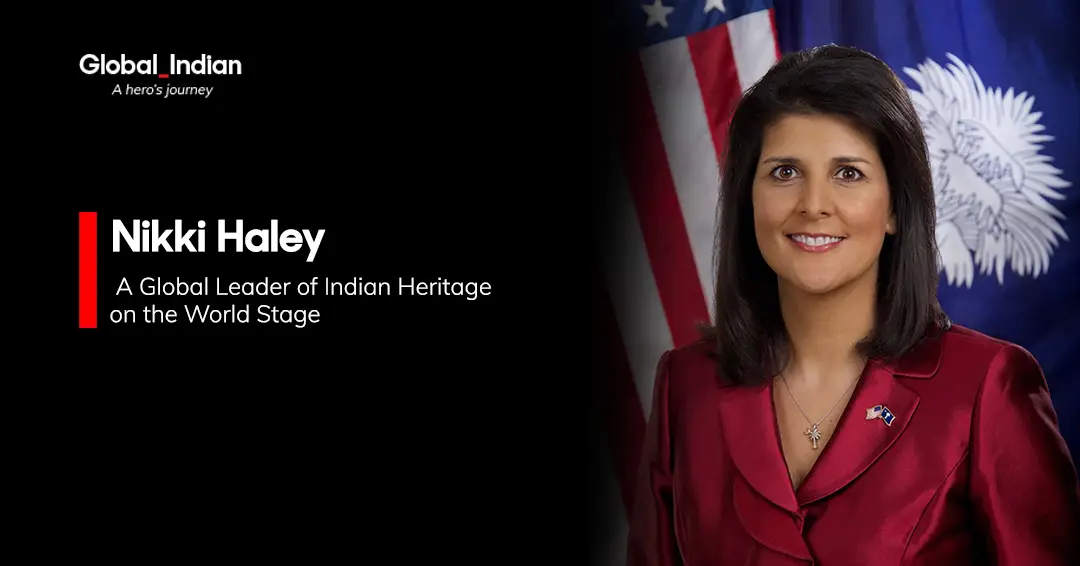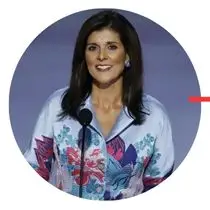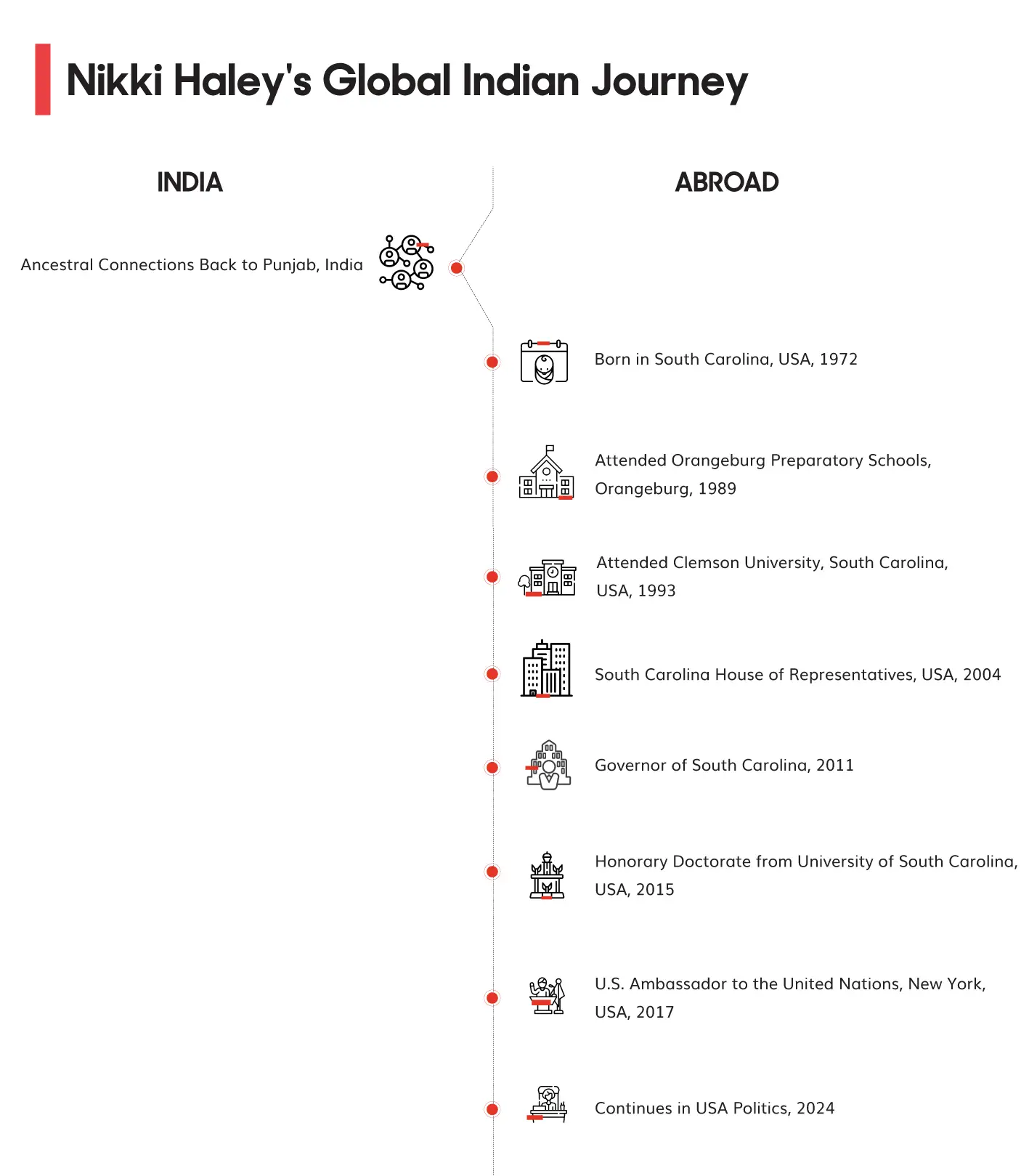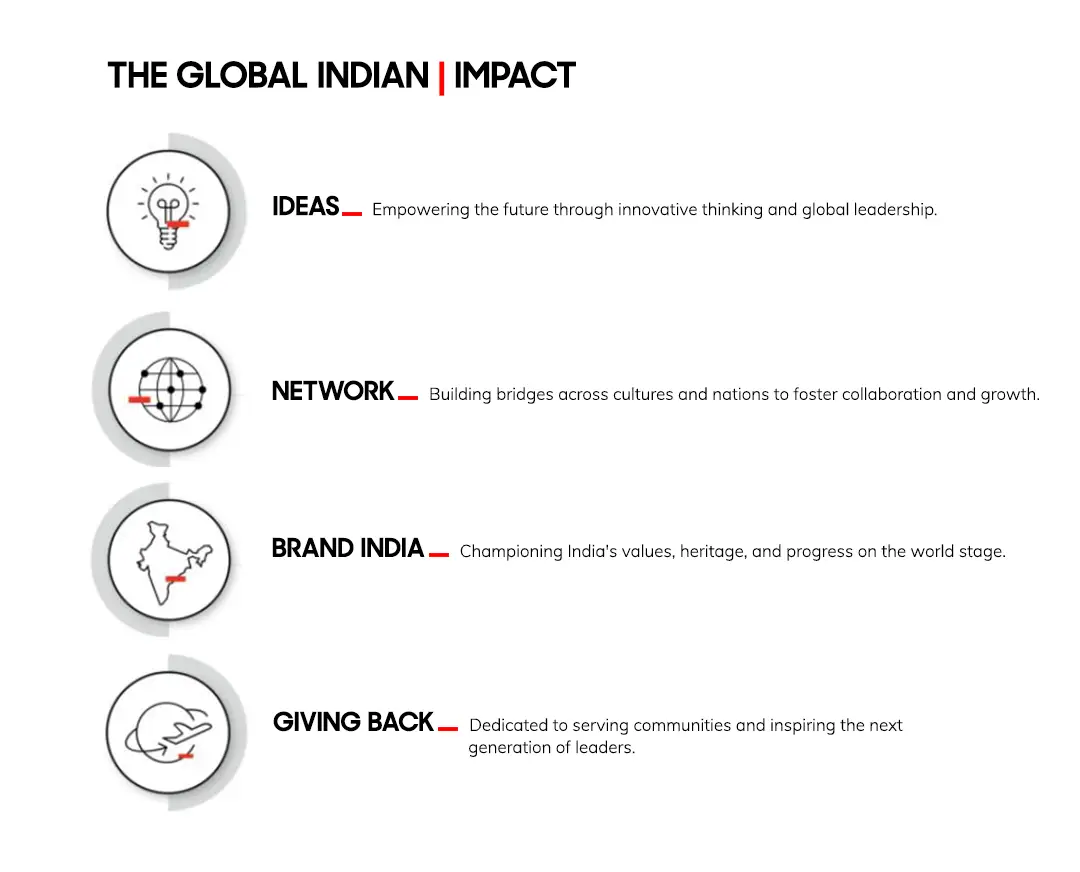
Nikki Haley
Nikki Haley broke multiple glass ceilings in her remarkable political career. The daughter of immigrant Punjabi Sikh parents from India, she was born on January 20, 1972. She made history as South Carolina’s first female governor and became the second U.S. governor of Indian descent. The Senate confirmed her as U.S. ambassador to the United Nations in 2017 with an overwhelming vote of 96-4. This appointment made her the first Indian American to serve in a Cabinet-level position.
A strong family foundation supported Haley’s rise in politics. Her husband Michael, an Army National Guard Captain, served in Afghanistan during her first term as governor. Her story began at age 13 in her family’s business, Exotica International – a small gift shop that grew into a multimillion-dollar clothing enterprise. She served three terms in the South Carolina House of Representatives before becoming governor. Under her leadership, the state’s unemployment rate dropped to a 15-year low. She helped create more than 85,000 jobs across South Carolina’s counties.
CEO’s | Actors | Politicians | Sports Stars
Haley’s political path led to her announcement on February 14, 2023, to run for the 2024 presidential election. She faced tough competition in the primaries but achieved a milestone as the first female Republican presidential candidate to win a primary contest in Washington, D.C. She suspended her campaign on March 6, 2024, after winning all but one of the Super Tuesday contests in Vermont. Her impact on American politics remains strong today.
“The best way to defeat terrorism is not with a speech, it’s with action.”

Early Life in Bamberg, South Carolina
Family background and Indian heritage
Immigrant Beginnings: Nikki Haley’s story starts with her parents, Raj Kaur Randhawa and Ajit Singh Randhawa, who left Amritsar, Punjab, India in the 1960s. They first moved to Canada in 1964, where Ajit worked toward his PhD at the University of British Columbia. Raj had earned her law degree from the University of Delhi and supported the family by working three jobs in Canada – she helped a child with special needs, worked at the post office, and sold cosmetics.
Academic Foundations: Ajit took a position as a biology professor at Voorhees College, a historically black institution in South Carolina, after finishing his doctorate in 1969. Raj started teaching social studies in Bamberg public schools and later opened her own clothing store. Life wasn’t easy for the family in this small town of about 3,000 people. Haley’s campaign noted that nobody wanted to rent to them at first.
Cultural Identity: Nimarata Nikki Randhawa was born on January 20, 1972, as the daughter of Bamberg’s first Punjabi Sikh immigrants. People knew her by her middle name “Nikki” – meaning “little one” in Punjabi – since she was young. She speaks openly about her unique experience growing up in the American South, saying: “I was the proud daughter of Indian immigrants – not Black, not white. I was different”.
Nikki Haley’s education and early influences
School Years: She graduated from Orangeburg Preparatory Schools in 1989. Her high school classmate Michael Delaney remembers that she wasn’t exactly a standout among the 1,000-plus students: “Back in high school with 1,000 students, or 1,100 students, it’s a little bit more, not lost in the crowd, but she wasn’t one of the big faces that she is today”. Yet everyone liked her “super friendly” personality.
Community Integration: The Randhawa family stood out at first in Bamberg, but longtime resident Marge Coker recalls that “it didn’t take long for people to really get to know them and to realize what wonderful people they are”. This acceptance helped Haley connect her Indian heritage with American culture.
Educational Path: She earned her Bachelor of Science degree in accounting and finance from Clemson University in 1994. Her choice reflected her career goals and her “huge love of numbers”.
Religious Journey: Though raised Sikh, Haley later became Christian. She explains this change came from language barriers rather than political reasons: “At some point, you have to understand the words…. Christianity spoke to me”. She still visits Sikh temples with her family.
Working in the family business
Early Responsibilities: Haley started helping with bookkeeping for her mother’s business, Exotica International, at age 12. She wrote in her 2012 autobiography: “I developed a huge love of numbers. When the store’s books were off by two cents, I loved finding those two cents”.
Business Growth: The small gift shop grew into a successful international clothing store. The business moved to a 10,000-square-foot facility in Columbia, the state capital. The family added menswear in 1993 with “The Gentlemen’s Quarters”.
Professional Development: After Clemson, she worked briefly at a recycling company in Charlotte before coming back to help run the family business. She took charge of accounting, budgeting, marketing, and sales reports until her mother retired in 2008. This business experience became central to her political campaigns, though records show the business faced tax penalties three times since 2003.
Foundational Experience: Haley’s presidential campaign video showcased the modest family home and business in Bamberg. These early years shaped her political identity. The business gave the family financial stability and practical skills while helping the Randhawas become respected members of small-town South Carolina.
From Indian to the World

From Business to Politics: The First Steps
Joining civic organizations and business groups
Community Engagement: Nikki Haley started building a vast network of professional connections after marrying Michael Haley in 1996. She took her first step into public service in 1998 by joining the Orangeburg County Chamber of Commerce board of directors. This move showed her growing influence beyond her family’s business.
Professional Leadership: The year 2003 marked Haley’s expanded organizational roles as she joined the Lexington Chamber of Commerce board. She became treasurer of the National Association of Women Business Owners (NAWBO) that same year, which highlighted her financial skills and leadership qualities. Her excellent work led NAWBO members to elect her as their president in 2004.
Expanding Influence: Haley’s community service grew stronger during this time. She led the Lexington Gala fundraiser for a local hospital and served on several foundations at once. These included the Lexington Medical Foundation, Lexington County Sheriff’s Foundation, and West Metro Republican Women. Her dedication made her a respected civic leader before she stepped into politics.
Winning a seat in the South Carolina House
Decisive Challenge: Haley made a bold move in 2004 by running for South Carolina House of Representatives District 87 in Lexington County. She aimed to replace Larry Koon, who had served longer than anyone else in the South Carolina Statehouse. She thought he would retire, but Koon surprised everyone by filing just before the deadline.
Historic Primary: The Republican primary turned into a close race. Koon received 42 percent, Haley got 40 percent, and David Perry earned 17 percent of votes. No one won a majority, so Haley and Koon went to a runoff on June 22. She beat the veteran lawmaker 55 percent to 45 percent in what became a major political upset.
Groundbreaking Victory: Haley ran unopposed in the general election and became South Carolina’s first Indian-American office holder. Her political star rose quickly. She won another unopposed term in 2006. By 2008, she had become so popular that she won reelection with 83.2 percent of the vote—the biggest win margin of any contested state representative race in South Carolina that year.
Key legislative priorities and early recognition
Leadership Roles: Her fellow lawmakers spotted her talents right away and chose her to lead the freshman caucus in 2005. She achieved an even more impressive feat in 2006 by becoming majority whip for the House Republican Caucus. No other freshman legislator had ever held a whip position before.
Economic Focus: Haley stood firm on her fiscal conservative principles throughout her time as legislator. She voted against a cigarette surtax three times, even though critics wanted the money for smoking prevention and cancer research. Yet she backed a bill that raised sales tax from 5% to 6% while exempting unprepared food and certain property taxes.
Education Reform: Haley brought change to teacher pay during her time as legislator. She created a system that looked at job performance along with seniority and qualifications. The new approach included feedback from principals, students, and parents to ensure accountability and measurable results.
Early Accolades: Governor Mark Sanford named her a “Taxpayer Hero” in 2005, and the South Carolina Association of Taxpayers called her a “Friend of the Taxpayer” in 2009. Hillary Clinton turned out to be an unexpected source of inspiration for Haley. After hearing Clinton speak about women in politics at Birmingham University, Haley decided then and there: “That’s it. I’m running for office”. This shows how political inspiration can cross party lines.
Governor of South Carolina: Breaking Barriers
Historic 2010 election and re-election in 2014
Breaking Barriers: Nikki Haley shattered records in South Carolina’s 2010 gubernatorial election. She became the state’s first woman governor and first person of color. Her victory margin of 4.46% came from 51.37% of votes against Democrat Vincent Sheheen’s 46.91%. She started as an underdog candidate but Sarah Palin’s surprise endorsement gave her campaign a boost.
Re-election Success: The 2014 rematch against Sheheen ended up as another win for Haley. This second victory established her as a rising Republican star and showed her strong connection with South Carolina voters.
Response to the Charleston church shooting
Tragedy Strikes: A dark day marked Haley’s governorship on June 17, 2015. A white supremacist walked into Emanuel African Methodist Episcopal Church in Charleston and killed nine Black parishioners during Bible study. Haley spoke about the emotional toll the next day: “We woke up today and the heart and soul of South Carolina was broken. And so we have some grieving to do”.
Leadership During Crisis: The community found strength in Haley’s response to this devastating event. She shared their grief and helped them heal. “As soon as the suspect was found and they had him back in custody, the best part about it is now we can start to heal,” she said.
Removing the Confederate flag
Historic Decision: The Charleston shooting changed Haley’s stance on the Confederate flag at the State Capitol grounds. This controversial symbol had flown there since 1962 as pushback against the civil rights movement. She had opposed its removal before the tragedy.
Meaningful Action: Haley put her signature on the bill to remove the Confederate battle flag on July 9, 2015. “May we never forget the actions that those people took to get us to this point today,” she said during the ceremony. She recognized that many South Carolinians saw the flag as “a deeply offensive symbol of a brutally oppressive past”.
Economic growth and job creation
Economic Success: Trade publications nicknamed South Carolina the “Beast of the Southeast” because of its strong economic growth under Haley. The state’s jobless rate dropped from 10.8% to 4.4% during her time as governor.
Business Expansion: South Carolina’s business landscape transformed under Haley’s leadership. “By the time I left, we were building planes with Boeing, we were building more BMWs than any place in the world, we brought in Mercedes-Benz, we brought in Volvo”. Her team brought in 86,000 jobs, 672 projects, and $21.5 billion in capital investments.
Stance on immigration and education reform
Immigration Policies: Haley’s governorship saw one of America’s strictest immigration laws. Police had to check suspects’ immigration status, and businesses needed to use E-Verify. She stood firm against Obama administration’s immigration policies and defended South Carolina’s laws.
Education Priorities: Parents gained more access to curriculum materials thanks to Haley’s push for transparency in education. She also promoted school choice programs that let students pick their preferred schools without extra costs.
UN Ambassador and Global Diplomacy
Appointment by Donald Trump
Historic Selection: Donald Trump named Nikki Haley as his UN ambassador pick in November 2016. She became the first non-white female cabinet-level official in his administration. The choice surprised many political observers. Haley had criticized Trump openly during the Republican primaries and supported Marco Rubio first, then Ted Cruz.
Political Calculus: Trump praised Haley as “a proven dealmaker” despite their past disagreements. The Senate confirmed her nomination with a strong bipartisan vote of 96-4. She stepped down from her role as South Carolina governor after the confirmation, letting Lieutenant Governor Henry McMaster take over.
Key foreign policy positions on Iran, Israel, and North Korea
Israel Advocacy: Haley proved herself one of Israel’s strongest defenders at the United Nations. Israel’s UN ambassador Danny Danon said that “with Nikki Haley’s appointment as U.S. ambassador to the United Nations, a new era was born”. She backed controversial decisions like moving the U.S. embassy to Jerusalem and cutting Palestinian refugee aid through UNRWA.
Iran Opposition: She took a firm stance against Iran and stated she “never thought the Iran deal could be fixed”. Her diplomatic visits to India included warnings about Iran becoming “the next North Korea”. Her position matched the Trump administration’s decision to leave the JCPOA (Iran nuclear deal) in May 2018.
North Korea Sanctions: Haley’s biggest diplomatic success came from pushing tougher sanctions against North Korea through the UN Security Council. The sanctions “cut off 90 percent of their trade and 30 percent of their oil”. She also called an urgent Security Council meeting about Russian violations of these sanctions, showing she would stand up to major powers.
Departure and reasons behind resignation
Unexpected Announcement: She revealed her plans to step down in October 2018, saying she would leave by year’s end. She spoke with President Trump in the Oval Office and brushed off rumors about personal reasons. She simply said that “it’s very important for government officials to understand when it’s time to step aside”.
Changing Influence: Her access to the President changed after Mike Pompeo became Secretary of State and John Bolton took the National Security Advisor role. She had regular Oval Office meetings during Rex Tillerson’s time, but these meetings became less frequent after the staff changes.
Future Aspirations: She made it clear she wouldn’t run for president in 2020 and promised to support Trump’s re-election campaign. Her resignation letter mentioned her 14 years of public service and her wish to work in the private sector. Financial concerns might have played a role, as her 2018 disclosure showed debts of at least INR 126.57 million.
The 2024 Presidential Campaign
Announcing her candidacy and campaign message
Bold Entrance: Nikki Haley kicked off her presidential bid on February 14, 2023. She became the first major challenger to Donald Trump’s Republican nomination. Her announcement video stressed the need for “new generational leadership” to tackle America’s challenges.
Campaign Focus: Haley’s campaign centered on foreign policy, economic issues, and immigration reform. She often showcased her UN ambassador experience during debates and campaign events.
Primary battles and key endorsements
Notable Support: Senators Lisa Murkowski and Susan Collins backed Haley’s campaign, along with former Maryland Governor Larry Hogan. The Koch-backed Americans for Prosperity endorsed her candidacy in November 2023, which brought vital resources to her campaign.
Electoral Challenges: Haley managed to keep around 40% support in early contests, even though she trailed Trump in most primaries. This revealed some weak spots in Trump’s candidacy. She did exceptionally well in suburban areas like Oakland County near Detroit.
Historic wins and campaign suspension
Groundbreaking Victories: Haley made history on March 3, 2024, as the first woman to win a Republican presidential primary in Washington, D.C.. She won Vermont on Super Tuesday and became the first woman to claim two Republican primaries.
Campaign Conclusion: Poor results across most Super Tuesday states led Haley to end her campaign on March 6, 2024. She didn’t endorse Trump in her concession speech. Instead, she said: “It is now up to Donald Trump to earn the votes of those in our party and beyond who did not support him”.
Post-campaign role at Hudson Institute
New Chapter: Haley joined the Hudson Institute, a conservative Washington think tank, as its Walter P. Stern Chair after her campaign ended. The institute’s strong pro-Ukraine and pro-Israel stance matches Haley’s foreign policy views.
Continued Voice: When she took this position, Haley promised to keep speaking up for her beliefs: “Although I will no longer be a candidate, I will not stop using my voice for the things I believe in”.
Giving Back
Nikki Haley has always emphasized the importance of “giving back” to her community and country. Throughout her career, she has been involved in several philanthropic efforts aimed at empowering others and improving society. As governor of South Carolina, Haley supported initiatives to help underserved communities, promote education, and create opportunities for economic growth. She has also been an advocate for women in leadership, encouraging young women to pursue careers in politics, business, and public service. In addition, Haley has supported various charities and causes, including those focused on education, veterans, and children’s health.
Haley’s personal story of rising from the daughter of Indian immigrants to a global leader serves as an inspiration to many, particularly in immigrant communities. She often speaks about the importance of giving back to one’s roots, whether through service, mentoring, or by making meaningful contributions to society. Through her actions and public service, Nikki Haley has demonstrated a commitment to making a difference and empowering others to do the same.
Key Takeaways
Breaking Barriers
Nikki Haley made history as the first female and first Indian-American Governor of South Carolina, demonstrating that leadership knows no boundaries of gender, race, or ethnicity.
Economic Leadership
As Governor, Haley focused on creating a business-friendly environment through tax cuts, deregulation, and attracting international investments, which helped boost South Carolina’s economy and create thousands of jobs.
Global Diplomat
As U.S. Ambassador to the United Nations, Haley stood out for her strong defense of U.S. interests, particularly in her support of Israel and her criticism of the Iran nuclear deal. She also played a key role in reshaping U.S. foreign policy, focusing on national sovereignty and a more assertive global presence.
Commitment to Giving Back
Haley has always emphasized the importance of service and giving back to the community. She advocates for women in leadership, supports charitable causes, and has worked to empower others, particularly young women, to pursue careers in politics and public service.
Inspiration for Immigrants
Growing up as the daughter of Indian immigrants, Haley’s success story resonates with immigrant communities, inspiring others to overcome challenges and succeed in their own journeys.
Resilience and Leadership
Throughout her career, Haley has exemplified resilience, tackling difficult issues head-on and providing leadership during crises, such as after the 2015 Charleston church shooting, where she played a pivotal role in removing the Confederate flag from the statehouse grounds.
Future Aspirations
As a 2024 presidential contender, Haley continues to shape her vision for the future, advocating for stronger national defense, secure borders, and conservative values while positioning herself as a leader for the next generation.
Global Indian Impact Analysis

Also Read: Kalpana Chawla, journey of an Indian-American astronaut.
Nikesh Arora, journey of an Indian-American business executive.
FAQ:
What is Nikki Haley’s net worth?
Nikki Haley’s net worth is estimated to be around $2 million to $4 million. Her wealth primarily comes from her career in public service, her time as Governor of South Carolina, and her role as U.S. Ambassador to the United Nations. In addition to her salary from these positions, she also earns through book deals, public speaking engagements, and consulting. Haley’s financial standing is reflective of her career success, entrepreneurial family background, and ability to leverage her public profile for additional income streams.
Who is Nikki Haley’s family?
Nikki Haley comes from a family of Indian immigrants. She was born to Ajit Randhawa and Raj Kaur Randhawa, both of whom moved from Punjab, India, to the United States in the 1960s. Her father was a professor at Voorhees College, while her mother ran a successful clothing store. Haley has two siblings: a brother, Mitt Randhawa, and a sister, Simran Randhawa, who is a doctor. Her family’s immigrant background deeply influenced her views on immigration, hard work, and resilience, playing a key role in shaping her public and political identity.
What is Nikki Haley’s nationality?
Nikki Haley is an American citizen. She was born in Bamberg, South Carolina, in 1972, to Indian immigrant parents. Though she identifies as Indian-American, her nationality is U.S. American. Throughout her career, Haley has navigated both her South Asian heritage and her identity as an American, often emphasizing her unique position as a product of both cultures. Her life story reflects the immigrant experience in America, and she has often spoken about how her background shaped her views on citizenship, opportunity, and the importance of integrating diverse perspectives into national identity.
Who is Nikki Haley married to?
Nikki Haley is married to Michael Haley, a former officer in the South Carolina Army National Guard. The couple got married in 1996, and they have two children together, a son, Nalin, and a daughter, Rena. Michael Haley has been a supportive partner throughout Nikki’s political career, often staying out of the spotlight but contributing to her public service. Their family dynamic is one of mutual support, with Michael taking on the role of a devoted father and spouse, allowing Nikki to focus on her demanding career in politics and public service.
What is Nikki Haley’s educational background?
Nikki Haley attended Clemson University in South Carolina, where she earned a Bachelor of Science in Accounting in 1992. During her time at Clemson, she was actively involved in campus life, honing leadership skills that would later serve her in politics. After graduating, Haley worked in accounting, including for her family business, before moving into public service. She is known for her practical and no-nonsense approach to leadership, which many attribute to her educational background in accounting, teaching her the value of fiscal responsibility and strategic thinking.
How old is Nikki Haley?
Nikki Haley was born on January 20, 1972, which makes her 52 years old as of 2024. Despite her relatively young age, Haley has already achieved significant political success, becoming one of the most prominent figures in American politics. Her leadership roles, including Governor of South Carolina and U.S. Ambassador to the United Nations, demonstrate her ability to influence policy on both the state and global stages. Haley’s age is often seen as an advantage, as she represents a new generation of leadership with a blend of experience and fresh perspectives.
What previous roles has Nikki Haley held?
Before becoming U.S. Ambassador to the United Nations, Nikki Haley held several key political roles. She was a State Representative in South Carolina from 2005 to 2011, and then served as the Governor of South Carolina from 2011 to 2017. During her time as governor, she focused on fiscal conservatism, job creation, and improving South Carolina’s economy. Haley’s early experience in state politics helped her build a platform for national leadership. After her time as governor, she was appointed by President Donald Trump as the U.S. Ambassador to the United Nations in 2017.
What is Nikki Haley’s relationship with Donald Trump?
Nikki Haley and Donald Trump had a professional and often respectful relationship during her time as U.S. Ambassador to the United Nations. While Haley was a strong advocate for many of Trump’s policies at the UN, she also occasionally showed independence, such as when she disagreed with the administration’s stance on certain issues. For example, she publicly opposed Russia’s actions in interfering with U.S. elections, a position that diverged from some of Trump’s comments. Despite occasional differences, Haley maintained a supportive working relationship with Trump, which later played a role in her decision to run for president in 2024.




